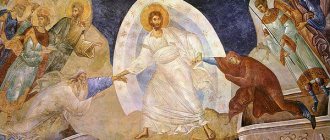Interpretation of the term
In the literal sense, the meaning of the word “acquire” indicates the acquisition of various material goods, that is, we are talking about accumulating property, working for the sake of obtaining benefits.
Typically, the term has a neutral meaning and simply implies the action of accumulation. At the same time, it can be modified to indicate sinful passions, for example, covetousness is a desire for hoarding and self-interest, that is, it has a clearly negative interpretation.
There is a teaching that was given by Seraphim of Sarov about the acquisition of the Holy Spirit, the acquisition by an Orthodox person of a number of positive merits and, as a result, spiritual benefits. It cannot be said that this concept was absent earlier, but Elder Seraphim more fully updated the concept and formalized it, so to speak, into a complete technique of spiritual practice.
Note! St. Seraphim took the terminology and used analogies that were most familiar and close to him.
The Sarov ascetic himself was from a merchant family; for such people, the most important thing is to acquire various material benefits and receive benefits.
Seraphim himself later compared his participation in the trading business in his youth, when he was looking for profit, with spiritual work, where one also needs to perform certain actions and receive spiritual benefits as profit.
Informative! What prayer to say before reading the Holy Gospel
Thus, in Orthodoxy they most often talk about the acquisition of the Holy Spirit, which has a purely positive meaning. Essentially, this term refers to the movement of each soul towards the Lord and the cultivation of faith within the individual spiritual path. The question is actually quite deep, so it's worth understanding this topic in a little more detail.
primary goal
On the path of his spiritual existence, the Orthodox strives to find himself in the Kingdom of Heaven, that is, to achieve the Salvation of the soul.
This opportunity is provided upon achieving the required degree of sinlessness (relatively speaking, in reality this is also an ambiguous question and, as they say, each situation must be considered separately), which ensures the acquisition of grace. Simply put, the diagram looks something like this:
- a person struggles with sins and gets rid of passions;
- the soul becomes purer;
- virtues replace passions and sins;
- a person acquires the Gifts and fruits of the Holy Spirit.
Various virtues are often used to combat passions and sins.
Thus, in this process they quite naturally crowd out the negative aspects of the personality and fill the Orthodox person entirely. If we consider in more detail, this process is much more multidimensional. After all, sins are not eliminated at once, and the process of the ascent of the soul can be replaced by periods of fall. In general, this topic deserves to be examined in detail by every Orthodox Christian for himself.
This is interesting! What does a woman need to go to a monastery?
An essential detail within the framework of the topic being considered now is one thing: the acquisition of the Spirit is a person’s movement towards the Lord. The better and more productively this process is carried out, the more holiness and virtue a person acquires, and vice versa.
The word “acquisition” in the texts of Holy Scripture
Here are some examples of the use of the word “acquisition” in the Church Slavonic texts of the Gospel and the Old Testament:
- When the young man heard the word, he went away mourning: for he had much gain (Matthew 19.22). The Evangelist Matthew describes an incident that occurred in Judea. A rich young man approached Christ with the question: how to please God? According to him, he strictly observed all ten commandments. Then the Lord, wanting to test the young righteous man, called him: “Give away your possessions and follow Me.” Hearing this, the young man sadly left Christ, because he had a lot of wealth that he was sorry to part with. In this short story, the word “acquisitions” is used to mean “possessions” accumulated over many years of wealth. These acquisitions prevent the young man from becoming perfect.
- Make his master of your house prince of all your acquisitions (Ps. 104). This is a verse from a psalm that describes an event in the Old Testament (i.e., before the Nativity of Christ). One of the twelve sons of Patriarch Jacob, Joseph, was sold into slavery by his own brothers to the Egyptians. But the Egyptian pharaoh immediately saw the beauty, intelligence and talents of the new slave. Soon he ordered Joseph to be appointed governor of his kingdom. In this case, the word “acquisitions” means “the property of the king,” that is, all state values belonging to the pharaoh and the people he owns.
- Remember your company, which you acquired from the beginning (Ps. 73). In this case, the “host” means the Jews whom God chose and “acquired” for Himself from the first times, that is, from ancient times.
Methods and results of acquisition
After it has become clear what acquisition is in the context of the Orthodox faith, we will next consider this aspect. The wise thoughts that the Venerable Elder Seraphim left to his spiritual children will be used as a basis.
Many writers and other representatives of the intelligentsia came to the monastery near Sarov, and in general the ascetic was quite well known; he devoted part of his earthly journey to regularly receiving Orthodox Christians, to whom he gave advice about the faith and instructed in every possible way.
Therefore, not only the icons that were copied from a lifetime portrait, and some objects that the saint used, but also his wisdom, captured in words, have survived to this day.
For simplicity, the acquisition of the Spirit is compared with ordinary accumulation, for example, there are such common phrases: “spiritual wealth”, “a person who has spiritual treasures”. Indeed, various spiritual achievements are often compared with various material values, it is more convenient, but you need to understand that we are talking about phenomena of a completely different order.
Note! The peculiar ephemerality of wealth in the information age can indicate the authenticity of only one wealth - spiritual.
The modern era is very interesting in terms of the meaning of acquiring material and spiritual values. Rich people often just own a set of numbers that are stored in the form of a bank account; simply some sets of data, images, and the like begin to be valuable. Therefore, the meaning of possessing something and accumulating something has a slightly different meaning than before. This state of affairs may even be interesting for analysis by Orthodox believers.
A person can accumulate or distribute material property at his own discretion, or he can use it for himself.
When it comes to attracting the Holy Spirit to oneself, it is difficult to talk about accumulating any amount of some kind of “substance” or “property”. It is best to use metaphors of approaching something or the metaphor of cleansing the mirror of the soul, known from the Eastern tradition.
It is important! What is father Herman’s reprimand for drunkenness and how to get there
Its surface is initially contaminated by the sinful human nature, but in the process of spiritual evolution the mirror can be cleansed by personal efforts and reflect Divine light.
Thus, the one who has advanced better in faith, as it were, lets in and absorbs the Heavenly light in a larger volume. It can reflect the original truth more accurately. If it is possible to put it this way, such a person is indeed, in a certain sense, closer to the Almighty, although we are, of course, not talking about spatial quantities, but about the purity of the soul, which is more consistent with the perception of the divine.
Fruits of the Holy Spirit
The Orthodox tradition describes in detail and in various ways how to move along the path of acquisition and achieve a positive result in this:
- prayer,
- fast,
- vigil,
- absence of sins,
- development of virtues.
All these methods of acquiring the holy spirit have long been known and are quite accessible for use by every Christian. Why then doesn’t everyone become saints or at least possessors of various gifts of the Holy Spirit? The question is quite logical, and the answer is elementary. It is difficult to move this way; as a rule, people are busy acquiring material things and prefer spiritual non-acquisitiveness, but ideally one should do the opposite.
Important! A strong prayer to Matrona of Moscow for help: what does it help with?
The listed methods must be done for the sake of Christ, then the so-called fruits of the Holy Spirit will appear:
- Love,
- joy,
- world,
- longsuffering,
- goodness,
- mercy,
- faith,
- meekness,
- abstinence.
It is also relevant here to list the Gifts of the Holy Spirit:
- wisdom,
- faith,
- knowledge,
- prophecy,
- miracle,
- healing,
- distinguishing and interpreting different languages,
- discernment of spirits,
- petition,
- exhortation,
- assistance;,
- teaching,
- Love.
There are others, but these are the main ones.
Love refers to the Gifts and Fruits of the Holy Spirit, and is also the highest Gift of the Holy Spirit, that is, in fact, the highest achievement that is available to the Orthodox. Actually, this is what Christ commanded: to love the Lord and your neighbor as yourself. God left such commandments when he established the New Covenant with man.
Advice from Saint Seraphim
The Apostles became the first owners of the Gifts, which they received or acquired on the day of Pentecost.
Thanks to this, the apostles had the opportunity to preach in other countries and show miracles to the pagans. The meaning of the words “to acquire holy gifts” was different for them, since what they received was to some extent an advance (which, by the way, everyone later repaid a hundredfold), due to their special position and relationship with Christ.
Now every Orthodox Christian can embark on his own path of faith and, if he tries, even compare to some extent with the apostles. This fact is confirmed by the examples of saints. For example, Seraphim of Sarov performed great miracles, although he tried to hide this fact from others.
Informative! Schedule of services in the Church of St. Elijah the Prophet
In addition to performing religious tasks - attending services and regular prayer - the tool of an Orthodox believer is the practice of virtue. Through good deeds, love for one's neighbor and the world is cultivated, but there is another significant aspect to consider. In simple words, this aspect is called motivation, although, in reality, it has a much more complex nature.
Acquisition, the meaning of the word in the works of the Holy Fathers
The Holy Fathers of the Church are the bishops of antiquity who compiled interpretations of the Gospel and the basic rules by which modern Christians live. The greatest of them were John Chrysostom and Basil the Great, bishops of Byzantium.
St. John Chrysostom, the famous preacher and denouncer of the unrighteous and unmerciful rich, explained in an accessible way to the common people what unrighteous acquisition is. He used the word “covetousness” and “acquisitiveness” in the sense of vice, love of acquiring extra, unnecessary wealth through violence and lies. A bribe-taker or a thief - they are all called covetous. St. Basil the Great notes: there is no more terrible covetousness than when a person does not share with the poor what “can be damaged,” that is, deteriorate over time.
In contrast to the accumulation of material wealth, the holy reverend fathers (monks) use the word “acquire” in the sense of acquiring spiritual treasures, cultivating good qualities in oneself. In the Patericons (collections of teachings of the venerable fathers) you can often find the following words:
- Acquisition of the Gospel virtues (chapter from the Skete Patericon).
- First of all, one must acquire humility (instruction of St. John).
- About acquiring love for God (St. Ignatius Brianchaninov, sermon).
Let's sum it up
The motivation lies in doing good for the sake of Christ. Not for the sake of virtue as such (just to do good), not for the sake of vanity or to feel good about yourself. Only if a believer surrenders and surrenders to Christ with all his mind and deeds can he acquire the grace of the All-Holy Spirit of God.
At the same time, Seraphim of Sarov advises believers to use reason in the matter of acquisition, just as merchants use it in order to get more profit. If you can sincerely pray, then through prayer that is deeply and sincerely done for the sake of Christ, it is possible to acquire grace. The Lord has granted someone the fortitude to withstand fasting and other compulsions of the body, then through these efforts it is necessary to elevate oneself spiritually.
Covetousness is a mortal sin in Orthodoxy
In Orthodoxy, the word “acquisitiveness” is understood as a painful, greedy desire for profit, as a thirst for acquiring and accumulating material values and money. Often this is an unrighteous, unfair and illegal desire to accumulate various kinds of values, which has nothing to do with the desire to live richly and prosperously, in prosperity and contentment.
In Orthodoxy, money-grubbing and greed are considered mortal sins.
It leads to internal discomfort, to profit at any cost, to attempts to take material values, money or fame, honor and fame undeservedly, regardless of the law and morality, the opinion of others.
Acquisitiveness and relationships
Acquisitiveness, like any deviations and illnesses, affects relationships with people, relationships with the team, neighbors, and family. Probably, greed, pettiness, and hoarding have the most destructive effect on family relationships: few people want to live life with an obsessed person, and not obsessed with some noble and high cause, but with hoarding and petty saving.
At work, in relationships with colleagues, there will be problems, because balance needs to be maintained in relationships, and a money-grubber is not able to give, he only strives to take.
It is very difficult to cure acquisitiveness and re-educate it. It is necessary to try to raise a person’s self-esteem, to show his worth regardless of money, to try to captivate him with something, although it is difficult to change an adult if he does not want to.
If a person himself wants to change and understands his addiction, we can assume that the first step towards recovery has been taken, in which case the help of family and friends will be useful.
Acquisitiveness as a painful addiction
We all strive to live better, to provide for our family, children and grandchildren. We all work and try to earn more so that we can buy everything we need for our family and friends. We all approve of people who were able to do this, sometimes we envy them, but we are not averse to achieving the same.
The desire to earn more for an ordinary person means the opportunity to improve the quality of life for themselves and the lives of loved ones, that is, to exchange the results of their labor for necessary services and goods.
For a money-grubber, the main goal is to constantly receive more money.
He does not set himself the goal of receiving a specific amount to fulfill any desire.
A negative attitude towards acquisitiveness is due to the fact that it is an unpleasant and painful dependence of a person on the acquisition of values, when money becomes the measure of everything, there are no other interests and aspirations, and other values are not important to a person. Sometimes money-grubbers save on literally everything: on clothing and quality food, on furnishings in the apartment, on vacation and treatment, although the income they receive allows them to live comfortably and in abundance.
For a money-grubber, money ceases to be a means of ensuring a normal life, a means of exchange; it becomes the main and only goal of life.
Signs of a money-grubber
A money-grubber exhibits character traits that repel people from him. Everyone avoids communicating with a person who has the following characteristics and habits:
- Pettiness reaching the point of absurdity, the desire to save every penny can lead to scandals in stores and at home.
- Excessive and inappropriate savings on everything: clothes that are too cheap, food of poor quality and only what is necessary, savings on entertainment, vacations and medicines.
- Attempts to make money bypassing the law and moral standards, not disdaining bribes, extortion, theft and begging.
- The hobbies of such a person are also always connected with the opportunity to get something: if fishing, then the fish will go to food or sale, or even poaching.











